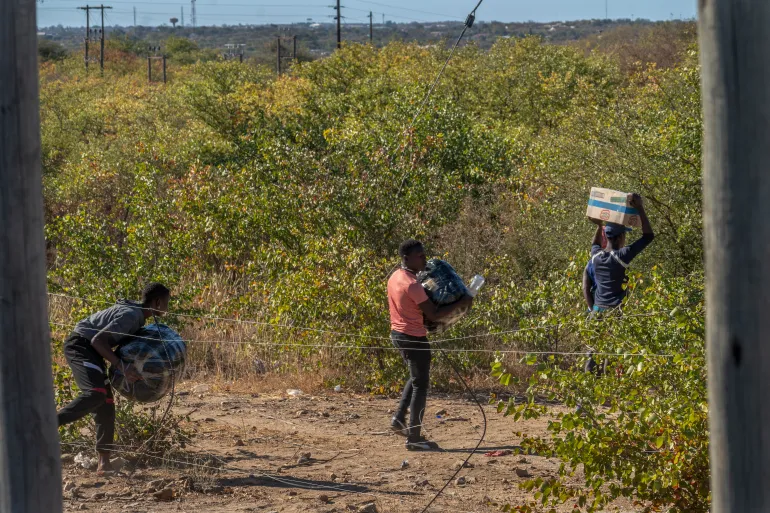
Refugee rights groups are pursuing legal action against South Africa’s Department of Home Affairs in response to what it claims are unlawful arrests, detentions, and deportations of new asylum applicants. They denounce these practices as a violation of human rights, the country’s Constitution, and international law, including the principle of non-refoulement.
A coalition of NGOs in South Africa–including GDP’s partner Lawyers for Human Rights (LHR) as well as the Scalabrini Centre–decided to file the case when reports started emerging in late 2023 that the Department of Home Affairs (DHA) was detaining people at the very Refugee Reception Offices where they must apply for asylum. “This process effectively denies individuals access to the asylum system, leaving them vulnerable to deportation to their home countries, where they face persecution, violence, war, detention, or even death. Such actions are a direct violation of the principle of non-refoulement, the cornerstone of refugee protection,” said the two organisations in a press statement released last week.1
Previously, in April 2024, a larger coalition of advocacy groups–which also included CoRMSA, KAAX, and SARLN–led a picket at Refugee Reception Offices across the country demanding to stop the arrests of new asylum applicants. They also called on DHA to take steps to ensure access to the asylum system and to prevent the deportation of people to countries where they face persecution, violence, or war.
Immigration Detention in South Africa
South Africa is a key destination country for migrants in Africa, attracting both mixed and irregular migration, labour migration and displacement movement. According to the IOM, most migration flows originate in neighbouring Zimbabwe as well as from countries in the Horn of Africa like Ethiopia and Somalia. Migrants and refugees face the threat of severe human rights violations if returned to these countries.
South Africa’s restrictive immigration and asylum policies are outlined in the Refugees Act, the Immigration Act and the Border Management Act (BMA), which came into force in July 2020, aiming “to strengthen border control and give the Authority effective control at the ports of entry and within the border law enforcement area.” The GDP has previously documented criticism over the country’s migration-related detention policies, including operations and conditions at its only privately-owned immigration detention facility–the Lindela Repatriation Centre–such as limited access to health, food and water, overcrowding and unsanitary conditions; the practice of holding people in police stations and prisons for immigration purposes; the corruption and bribery in police and immigration bureaucracies that operate detention sites and administer the asylum process; allegations of abuses and the use of force at detention facilities; prolonged detention periods (over the legal maximum of 120 days); and restricted access to legal representation.
In 2023, South Africa published the White Paper on Citizenship, Immigration and Refugee Protection: Towards a complete overhaul of the Migration System in South Africa. The paper sets out a series of policies that further restrict access to pathways for regularisation for migrants and will likely increase pressures to boost the use of immigration detention. In a submission on the White Paper, LHR argued that “the proposed policy shift falls short of what is needed to manage the challenges facing South Africa, and also falls short of the constitutional principles and standards recorded throughout our jurisprudence.”
Member states of the UN Human Rights Council have also raised concerns about South Africa’s immigration detention practices, including lack of transparency and concerns over the treatment of unaccompanied children as part of the country’s 2022 review during the Universal Periodic Review.
In December 2023, LHR released a press statement saying, “Challenges such as lack of access to documentation, corruption, irregular law implementation, homophobia and xenophobia render migrants – predominantly black African migrants – susceptible to arbitrary arrest and detention based on their documentation status.”
South Africa’s general elections lead to increased xenophobic rhetoric
Observers reported threatening rhetoric, scapegoating, and xenophobic violence directed at foreign nationals during the lead-up to South Africa’s recent general elections. The campaigns focused enormous energy on the topic of irregular migration. According to Reuters, “the government as well as the opposition have increasingly talked about tightening immigration laws to reduce the number of arrivals, and about cracking down on undocumented immigration.” In April, the ANC-led government published a report pushing for a slate of tough policy changes, which, Reuters says, “raised the possibility that South Africa could withdraw from United Nations conventions on refugees to ‘deter economic migrants who come to South Africa disguising as asylum seekers’.”
- For more information about the court case, contact Nabeelah Mia (Lawyers for Human Rights) at: nabeelah@lhr.org.za ↩︎


